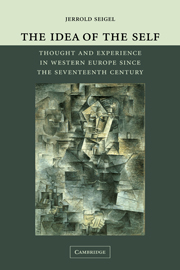Book contents
- Frontmatter
- Contents
- Acknowledgments
- PART I INTRODUCTORY
- PART II BRITISH MODERNITY
- PART III SOCIETY AND SELF-KNOWLEDGE: FRANCE FROM OLD REGIME TO RESTORATION
- PART IV THE WORLD AND THE SELF IN GERMAN IDEALISM
- 9 Autonomy, limitation, and the purposiveness of nature: Kant
- 10 Homology and Bildung: Herder, Humboldt, and Goethe
- 11 The ego and the world: Fichte, Novalis, and Schelling
- 12 Universal selfhood: Hegel
- PART V MODERN VISIONS AND ILLUSIONS
- Notes
- Index
12 - Universal selfhood: Hegel
Published online by Cambridge University Press: 05 June 2012
- Frontmatter
- Contents
- Acknowledgments
- PART I INTRODUCTORY
- PART II BRITISH MODERNITY
- PART III SOCIETY AND SELF-KNOWLEDGE: FRANCE FROM OLD REGIME TO RESTORATION
- PART IV THE WORLD AND THE SELF IN GERMAN IDEALISM
- 9 Autonomy, limitation, and the purposiveness of nature: Kant
- 10 Homology and Bildung: Herder, Humboldt, and Goethe
- 11 The ego and the world: Fichte, Novalis, and Schelling
- 12 Universal selfhood: Hegel
- PART V MODERN VISIONS AND ILLUSIONS
- Notes
- Index
Summary
Like his German predecessors, but in his own remarkable way, Hegel posited the idea of the self as the conceptual foundation for understanding the world. Every object of knowledge was to be grasped on the model of the self, which had therefore to be comprehended correctly before serious inquiry could properly begin. Hegel's project is seldom described in just this way, and partly for the good reason that a number of other terms are equally central to it, most famously spirit (Geist), and also dialectic, alienation, reconciliation, notion (Begriff), and subject-object. But especially in the Phenomenology of Spirit, his first substantial book, and probably his greatest, the one that announced and underpinned his whole philosophical enterprise, Hegel made clear that grasping the true nature of the self was the point from which the truth he sought could be reached. It was in Hegel that the isomorphism of self and world projected by his German predecessors reached its most elaborate and consequential form.
Hegel's focus on the self developed in direct response to Fichte and Schelling, both of whom had proceeded from the idea of the ego as an “absolute,” that is, as the original, undivided, unlimited form of being. From this, as we have seen, each developed a different but intimately related way to make knowledge of the ego's being and structure the ground for knowing life, history, nature, even God. Hegel would give the same place to the idea of the self, but conceived in a different way.
- Type
- Chapter
- Information
- The Idea of the SelfThought and Experience in Western Europe since the Seventeenth Century, pp. 391 - 424Publisher: Cambridge University PressPrint publication year: 2005

